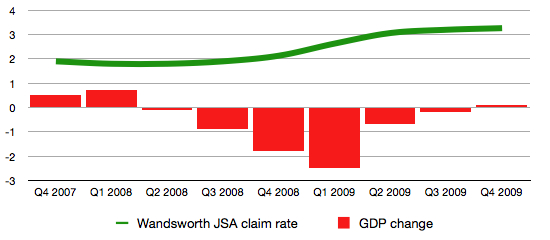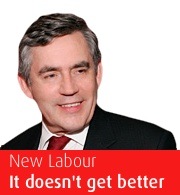Gordon Brown’s deathbed conversion to electoral reform has certainly stirred up some interest in our electoral system. And not a little cynicism about why, despite having a commitment to electoral reform in their 1997 manifesto it has taken until now to do anything about it.
It seems to confirm that Brown’s strategy is to play for a messy draw at the polls. Perhaps at night, as he rests his weary head, he fantasises about a minority Conservative government struggling with public finances and making themselves unpopular, while the population start to yearn for the good old days of Brown and, eventually, he is carried aloft on the shoulders of a loving (and repentant, how dare they have rejected him?) public back into Downing Street.
But what I’ve not really seen is any defence of our first past the post electoral system. A system I rather like.
“Well, you are a Tory,” you may snort, “and of course you don’t want change.” But I have actually changed my opinion on a number of constitutional issues. Having been fiercely proud of our unwritten constitution after 13 years of seeing our rights and liberties eroded I’m increasingly drawn to the idea of having a written constitution and bill of rights. I used to see the benefit of hereditary peers, but now recognise that for the one or two whose life experience enhanced the second chamber there were many more who added nothing to our Parliament other than a few minutes attendance to claim their allowances. And while I enjoy traditions like election night, I’m far from wedded to it and see no point in keeping something that – really – seems to be surviving purely because political anoraks want it.
But I do like the electoral system, even though it is currently weighted against the Conservatives to the extent that we could win the vote by a decent margin and still lose the election. I won’t pretend my reasons are novel, they aren’t, they are the same old arguments you’ve heard before. But that doesn’t mean they aren’t good arguments.
For a start, first past the post delivers good results. And by good results I mean decisive results. Since the war it has tended to reflect the public mood rather well. In 1945 it produced the massive victory for Clement Attlee to start the building of post-war Britain. Then it switched between Tory and Labour administrations to reflect the country’s preference for (Butskellite) paternalistic government. It gave us Thatcher to rescue us from the failings of 70s intervention and (to prove that I can see the other side of arguments) it gave us Blair to rescue us from Thatcherism.
The consistent theme is that it provides us with strong governments, but can produce decisive change when that change is needed.
I was having an interesting conversation the other day about whether politics should be representative (essentially that politicians should try to change and adapt to reflect the prevailing public mood on any issue at any time) or should be about leadership (politicians should present their beliefs and policy platform, then deliver on that if elected and stand on that record at a subsequent election). While it isn’t black and white I tend to favour the latter; politics should be about more than just representing the results of a referendum of public opinion, or passing on the opinions of a focus group. First past the post means we can have strong leadership and government.
Having said that ironically, first past the post does lend itself to that more representative form of democracy – since there is a direct link between a member and their constituency. There is none of the mess of multi-member constituencies or party selected lists. People vote for their member and he or she represents their interests. This link, I would contend, is a strength.
But most importantly it keeps power with the people – even if they delegate it every five years – and keeps our politics in the mainstream. Instead of coalitions agreed between party leaders we have governments chosen by the changes in public opinion. Germany was a great example of how a third party dominated politics by effectively deciding who won the election it was only a few years ago that an election, rather than the third party’s whim, actually changed their government. And because it means parties have to appeal to a broad spectrum of the public if they are ever to stand a chance of winning a seat it means extremism remains marginalised. We would not have seen the BNP winning seats in the European Parliament under the old first past the post system. Is it fair that small parties are effectively doomed to constant electoral defeat? Perhaps not. But when it’s the BNP, are you going to complain?
What we really need is a shift in power in the country. Not by changing the electoral system, but from the government to Parliament, so the votes that people cast don’t just make a difference when aggregated nationally, but make a difference locally. We need MPs who have real power to hold the government to account and make a difference to their constituency. That would start to produce a real change and help address the massive disaffection people have with the political process.
Making votes matter isn’t about knowing that your vote elected 1/60,000th of an MP somewhere. It’s about knowing that whoever is elected can make a difference.
Sadly though, unless you can spin that into something that might convince Brown it would save his skin, it isn’t going to be taken up by this Prime Minister.

 Towards the end of last year Labour activists seems significantly buoyed by a series of polls that showed them only nine or ten points behind the Conservatives in polls. Frankly I was bemused that it caused such delight amongst Labour activists. Surely a nine point deficit is not a cause for celebration, after all, their margin of victory in 2005 was significantly less, just 3%. In 2001 when they had a 247 seat majority their margin of victory was 9%. In moral terms, if not electoral, a 9% deficit is not a cause for celebration. But as
Towards the end of last year Labour activists seems significantly buoyed by a series of polls that showed them only nine or ten points behind the Conservatives in polls. Frankly I was bemused that it caused such delight amongst Labour activists. Surely a nine point deficit is not a cause for celebration, after all, their margin of victory in 2005 was significantly less, just 3%. In 2001 when they had a 247 seat majority their margin of victory was 9%. In moral terms, if not electoral, a 9% deficit is not a cause for celebration. But as 
 My emasculation was completed this morning when I took MiniMe to Monkey Music for the first time.
My emasculation was completed this morning when I took MiniMe to Monkey Music for the first time.